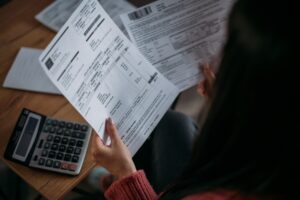
Over half of people in poverty are finding it difficult to pay for their insurance amidst the cost-of-living crisis – leading some to give up insurance as they prioritise food and energy bills, new report warns today.
New research by the Social Market Foundation (SMF), supported by Fair By Design, found that insurance is becoming increasingly unaffordable for those on low incomes as they are charged “a poverty premium” – meaning they pay more for insurance cover due to reasons they cannot control, such as where they can afford to live.
People on low incomes can pay £300 more on car insurance than better-off drivers simply because of their postcode. People in poverty also pay more for their insurance cover because they can’t afford to pay for it all in one go. Additional charges for paying for car insurance monthly instead of annually could mean an extra £160.
The SMF, a cross-party think-tank, examined the insurance market for people in poverty in partnership with Fair By Design, which campaigns to end the “poverty premium” – the extra costs people on low incomes and in poverty pay for essential products and services.
The research found that just 7% of people believe that it is fair that those on lower incomes pay more for their insurance, and the majority believe that it is unfair. Findings are based on a survey of more than 1,500 adults from low-income households in the UK, and focus groups with people living in poverty.
The extra costs that make insurance more expensive have a knock-on effect on insurance take-up, already low amongst lower-income families. This can leave people unprotected against life events that could push them to the edge. The SMF estimates that 5 million people in poverty would find it impossible to pay for an unexpected cost of £500 without outside assistance. Over the next five years, an estimated 2 million people in poverty could have to face an insurable loss.
The report is to be launched today at an event (see Notes) with Tulip Siddiq, Labour’s Shadow City minister, and Nicky Morgan, former Conservative chair of the Treasury Select Committee, and Matt Brewis of the Financial Conduct Authority (FCA).
The report concludes that despite the existence of the poverty premium in insurance, neither the Government nor regulator are prepared to take action, as each points to the other as being responsible. The report calls on the Financial Conduct Authority (FCA) – the industry regulator – to urgently investigate the causes of the ‘poverty premium’ and report on firms’ approach to the issue. It also calls on the Government to take action on the findings of this investigation and consider solutions such as state-backed insurance products for people on low incomes or banning certain rating factors.
James Kirkup, Director of the Social Market Foundation, said: “Insurance is rightly seen as an essential good, something that everyone should have to protect them from unexpected losses. Yet the insurance market is operating in a way that means too many people in poverty either can’t afford that product, or face unexplained higher costs when they do buy it.
“People going without insurance reflects both the cost of living crisis and the way the insurance market works for people in poverty. We need politicians and regulators work with the insurance industry to investigate the causes of the poverty premium so that everyone can get this vital product at a reasonable price.”
“The insurance industry is providing an important product that supports the finances and peace of mind of millions of households. We hope the sector will rise to the challenge of addressing the poverty premium to ensure even more people can benefit from insurance.”
Read more:
Priced out – Poor people giving up insurance due to ‘poverty premium’

